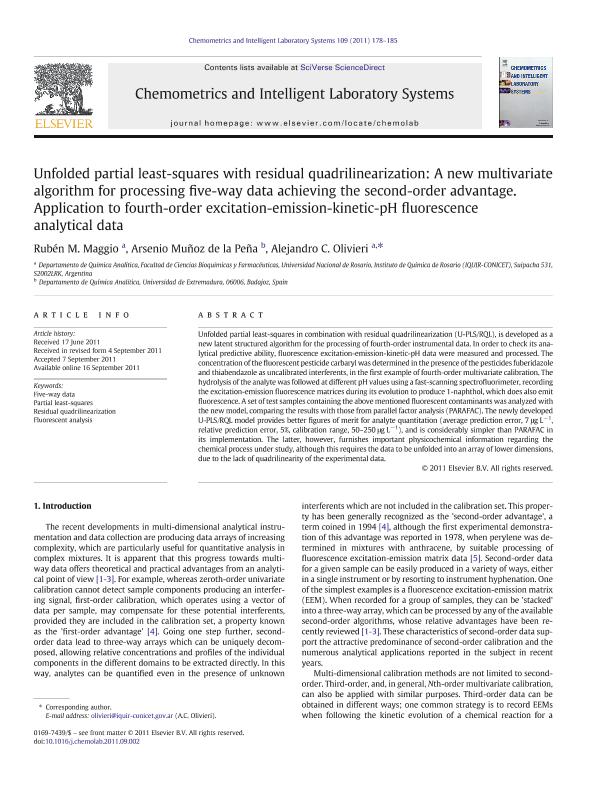Mostrar el registro sencillo del ítem
dc.contributor.author
Maggio, Ruben Mariano

dc.contributor.author
Peña, Arsenio Muñoz de la
dc.contributor.author
Olivieri, Alejandro Cesar

dc.date.available
2020-06-23T19:58:22Z
dc.date.issued
2011-12
dc.identifier.citation
Maggio, Ruben Mariano; Peña, Arsenio Muñoz de la; Olivieri, Alejandro Cesar; Unfolded partial least-squares with residual quadrilinearization: A new multivariate algorithm for processing five-way data achieving the second-order advantage. Application to fourth-order excitation-emission-kinetic-pH fluorescence analytical data; Elsevier Science; Chemometrics and Intelligent Laboratory Systems; 109; 2; 12-2011; 178-185
dc.identifier.issn
0169-7439
dc.identifier.uri
http://hdl.handle.net/11336/107991
dc.description.abstract
Unfolded partial least-squares in combination with residual quadrilinearization (U-PLS/RQL), is developed as aew latent structured algorithm for the processing of fourth-order instrumental data. In order to check its analytical predictive ability, fluorescence excitation-emission-kinetic-pH data were measured and processed. The concentration of the fluorescent pesticide carbaryl was determined in the presence of the pesticides fuberidazole and thiabendazole as uncalibrated interferents, in the first example of fourth-order multivariate calibration. The hydrolysis of the analyte was followed at different pH values using a fast-scanning spectro fluorimeter, recording the excitation-emission fluorescence matrices during its evolution to produce 1-naphthol, which does also emit fluorescence. A set of test samples containing the above mentioned fluorescent contaminants was analyzed with the new model, comparing the results with those from parallel factor analysis (PARAFAC). The newly developed U-PLS/RQL model provides betterfigures of merit for analyte quantitation (average prediction error, 7μg/L, relative prediction error, 5%, calibration range, 50–250 μg/L), and is considerably simpler than PARAFAC in its implementation. The latter, however, furnishes important physicochemical information regarding the chemical process under study, although this requires the data to be unfolded into an array of lower dimensions, due to the lack of quadrilinearity of the experimental data.
dc.format
application/pdf
dc.language.iso
eng
dc.publisher
Elsevier Science

dc.rights
info:eu-repo/semantics/openAccess
dc.rights.uri
https://creativecommons.org/licenses/by-nc-sa/2.5/ar/
dc.subject
Five-way data
dc.subject
Partial least-squares
dc.subject
Residual quadrilinearization
dc.subject
Fluorescent analysis
dc.subject.classification
Química Analítica

dc.subject.classification
Ciencias Químicas

dc.subject.classification
CIENCIAS NATURALES Y EXACTAS

dc.title
Unfolded partial least-squares with residual quadrilinearization: A new multivariate algorithm for processing five-way data achieving the second-order advantage. Application to fourth-order excitation-emission-kinetic-pH fluorescence analytical data
dc.type
info:eu-repo/semantics/article
dc.type
info:ar-repo/semantics/artículo
dc.type
info:eu-repo/semantics/publishedVersion
dc.date.updated
2020-05-05T13:03:40Z
dc.journal.volume
109
dc.journal.number
2
dc.journal.pagination
178-185
dc.journal.pais
Países Bajos

dc.journal.ciudad
Amsterdam
dc.description.fil
Fil: Maggio, Ruben Mariano. Consejo Nacional de Investigaciones Científicas y Técnicas. Centro Científico Tecnológico Conicet - Rosario. Instituto de Química Rosario. Universidad Nacional de Rosario. Facultad de Ciencias Bioquímicas y Farmacéuticas. Instituto de Química Rosario; Argentina
dc.description.fil
Fil: Peña, Arsenio Muñoz de la. Universidad de Extremadura; España
dc.description.fil
Fil: Olivieri, Alejandro Cesar. Consejo Nacional de Investigaciones Científicas y Técnicas. Centro Científico Tecnológico Conicet - Rosario. Instituto de Química Rosario. Universidad Nacional de Rosario. Facultad de Ciencias Bioquímicas y Farmacéuticas. Instituto de Química Rosario; Argentina
dc.journal.title
Chemometrics and Intelligent Laboratory Systems

dc.relation.alternativeid
info:eu-repo/semantics/altIdentifier/url/https://www.sciencedirect.com/science/article/abs/pii/S016974391100181X
dc.relation.alternativeid
info:eu-repo/semantics/altIdentifier/doi/http://dx.doi.org/10.1016/j.chemolab.2011.09.002
Archivos asociados
